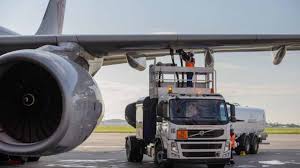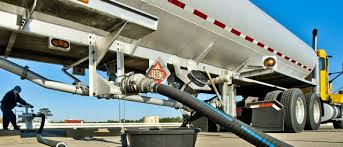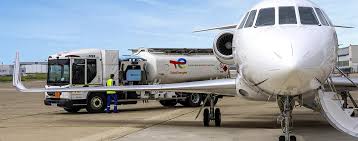![]()
If you’ve landed on this article page, you’re probably searching for a
good business idea—an idea that’s light on the pocket but heavy on
returns, promising both a fulfilling journey and potential profit.
|
How to start an Aviation fueling
service in Nigeria
Aviation fueling service involves delivering and dispensing
necessary petroleum-based fuels, oils, and lubricants to enable
airline operations across aviation segments from passenger
airliners to private recreational planes or jets. Highly trained
to handle volatile payloads meeting airport authority safety
mandates, mobile fueling fleets provide quick replenishment
preventing delays through on-tarmac pumping from storage base
direct to aircraft. Real-time supply monitoring also gives
pilots peace of mind confirming ample provisions are available
for route durations, unlike automotive fill-ups. For
fixed base operators constrained by landside space limits,
outsourced vendors offer essential refueling assistance without
acquiring more tanks and trucks solely for peak overflow needs.
As global tourism rebounds and corporate travel intensifies
again, aviation fuel teams uphold the behind-the-scenes energy
crucial for powering world mobility via air transit supporting
life-saving organ deliveries as much as long-overdue vacations.
How much you can make: $100K
– $1M annually
PROCEDURE
Application for Registration as an aviation fuel supplier shall
be made in writing and addressed to the Director General,
Nigerian Civil Aviation Authority (NCAA).
The application shall be signed by the lead promoter of the
proposed business or Chief Operating/Executive Officer of the
applicant company.
The application shall be submitted to the office of the Director
General, Nigerian Civil Aviation Authority (NCAA) on or before a
date not less than six (6) months to the intended date of
commencement of operation.
REQUIREMENTS
A. The application
for Registration must contain the following initial particulars:
i.
Name and official company address(es) of applicant, as
well as:
Applicant’s CAC Registration Number (RC)
Contact telephone numbers
Valid e-mail address(es)
Names and nationalities of Directors of the company at the
bottom of the page
ii.
Airports/terminals where the applicant operates and airports for
intended operation, if any.
iii.
Name(s) and full address(es) of the technical partner(s), with
copy/copies of the relevant
agreement(s);
B. The
applicant is expected to submit the following documents:
i. Evidence of
Payment of Five Hundred Thousand Naira (N500,000.00)
non-refundable processing
fee, as well as Two Hundred Thousand Naira (N200,000.00)
Depot/Facility Approval Fee per
Depot to NCAA (Bank draft made payable to the Authority).
ii.
Completed processing form (NCAA/AFS/Form.01) with the evidence
of payment of the above
N500,000.00 non-refundable processing fee and all the
depot approval fees.
iii.
Certified true copy of the company’s Certificate of
Incorporation;
iv.
A certified true copy of the company’s Memorandum and
Articles of Association;
v.
Statement of share capital/return of allotment of shares
(Form CAC 2) indicating Minimum Authorized
Share Capital of One Hundred Million Naira
(N100,000,000.00); and ownership structure of the
company reflecting Majority Shareholding and control
vested in Nigerian nationals;
vi.
Company Profile, including ownership structure and list
of Directors of the company;
vii.
Copy of a valid Petroleum Products Import Licence/Permit
issued by the Department of Petroleum
Resources (DPR) or evidence of
through-put arrangement with a shore/coastal depot or
evidence of
ownership of coastal depots;
viii.
Evidence of Depot Agreement (Lease etc) or Space
Allocation for storage depot in each airport of
operation, issued by the Federal Airports Authority
of Nigeria (FAAN);
ix.
Evidence of tax payment issued by Inland Revenue Service
and copies of tax clearance certificates of
the company and each of the directors, for the last three
(3) years;
x.
Evidence/details of insurance policy to cover the business
indicating One Billion US Dollars (USD 1
Billion) cover for each airport;
xi.
Feasibility study report detailing the proposed
operations plans for each of the intended airports;
xii.
List of key personnel responsible for the Aviation Fuel
Supply services of the company; and in
respect of each of the airports served by the company,
with evidence of their relevant
background(s), e.g training
certificates, licences, curricula vitae etc;
xiii.
Curriculum vitae as well as evidence of relevant training
of each Director (e.g certificates, licences);
xiv.
Minimum of three (3) serviceable browzers and
accessories.
Becoming a jet fuel broker can be an exciting and lucrative
career path for those interested in the aviation industry. Jet
fuel brokers play a crucial role in the supply chain by
connecting fuel suppliers with buyers, negotiating prices, and
ensuring timely delivery of the fuel. In this article, we will
explore the steps one can take to become a successful jet fuel
broker.
Firstly, it is important to have a strong understanding of the
aviation industry and the fuel supply chain. This includes
knowledge of the different types of fuels used in aviation, the
regulations surrounding fuel transportation and storage, and the
key players in the industry. A background in business, finance,
or logistics can also be helpful in this field.
Secondly, networking is key in the jet fuel brokerage industry.
Building relationships with fuel suppliers, buyers, and other
industry professionals can help one gain valuable connections
and insights into the market. Attending industry events and
conferences, joining professional organizations, and reaching
out to potential clients can all be effective ways to expand
one’s network.
Lastly, obtaining the necessary licenses and certifications is
crucial to becoming a successful jet fuel broker. This includes
obtaining a broker’s license, as well as certifications in
hazardous materials transportation and safety. Staying
up-to-date on industry regulations and trends is also important
for maintaining a successful career in jet fuel brokerage.
Understanding the Jet Fuel Market
Global Demand and Supply
The global demand for jet fuel is primarily driven by the growth
of the aviation industry. According to the International Air
Transport Association (IATA), the number of air passengers is
expected to double by 2037, which will lead to an increase in
demand for jet fuel. The demand for jet fuel is also influenced
by economic growth, geopolitical tensions, and natural
disasters.
On the supply side, jet fuel is produced by refineries that
process crude oil. The availability of crude oil, refinery
capacity, and government policies on refining and exporting
crude oil can impact the supply of jet fuel.
The jet fuel market is dominated by a few major players,
including oil companies, airlines, and trading companies. The
major oil companies that produce and sell jet fuel include
ExxonMobil, Royal Dutch Shell, BP, and Chevron. Airlines also
play a significant role in the jet fuel market as they are the
primary consumers of jet fuel. Trading companies, such as
Glencore and Trafigura, also participate in the jet fuel market
by buying and selling jet fuel on the open market.
Price Determinants
The price of jet fuel is determined by a variety of factors,
including the price of crude oil, refinery capacity, demand for
jet fuel, and geopolitical tensions. The price of crude oil is
the most significant factor in determining the price of jet
fuel, as jet fuel is derived from crude oil. Refinery capacity
and demand for jet fuel can also impact the price of jet fuel by
affecting the supply-demand balance. Geopolitical tensions, such
as conflicts in oil-producing regions, can also impact the price
of jet fuel by disrupting the supply of crude oil.
In summary, understanding the global demand and supply, key
players, and price determinants in the jet fuel market is
essential for anyone looking to become a jet fuel broker.
Get our Practical Guide on how to start an Aviation Fueling Service in Nigeria. Before starting a jet fuel brokerage business, it is essential to develop a comprehensive business plan that outlines the goals, strategies, and financial projections of the venture. Our Training guide include an analysis of the market demand, competition, and potential customers. It also outline the services the brokerage will offer, such as fuel sourcing, transportation, and delivery. By following our steps, aspiring brokers can establish a successful business that meets the needs of their clients and the market.
|







